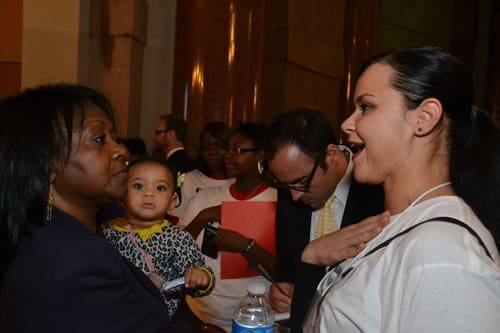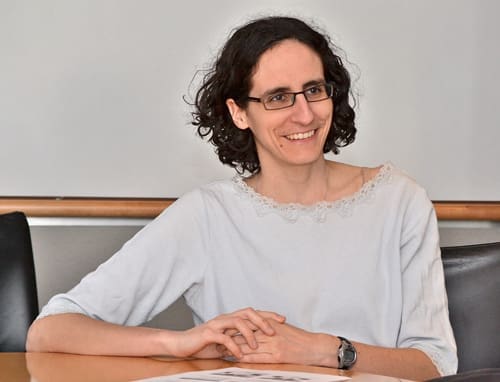
Advocate Renee Radosz, at right, speaks to Rep. Mary Flowers about opposing cuts to HIV services. AFC Photos-Ed Negron
The advocates woke in the dark before dawn and trudged half-asleep onto a bus bound for Springfield.
Bound together by a single purpose, they came from Chicago’s distinct neighborhoods, from the rural communities of southern and western Illinois, from the North Shore towns stretching toward Wisconsin. The narratives of their lives were utterly distinct; their stories were proof that HIV can affect anyone.
Most of the 200 or so advocates who traveled to Springfield for Lobby Day last week had been living with HIV for many years. Others were social workers who had dedicated their lives to confronting the AIDS epidemic. But all of them, on some level, had been deeply affected by the epidemic and weren’t about to stand by quietly when $4 million in essential HIV services were placed on the chopping block.
The mission was simple but demanded courage: To track down their respective legislators and tell their stories, to impress upon lawmakers why it’s important to fully fund HIV services.
“I hope to get them to think about the bill before they vote on it,” said Mark Canser, 47, an HIV-positive Chicagoan. “We are trying to survive in this world and we can’t survive with these cuts. … Life depends on this.”
It was Canser’s first time participating in the annual Lobby Day, the annual advocacy event facilitated by the AIDS Foundation of Chicago (AFC). The severity of the cuts proposed to HIV services, coupled with the looming Medicaid cuts, brought out first timers and veterans alike.
After a training session at a nearby hotel, they walked to the state Capitol and began their day’s work. Splitting into small groups led by more experienced advocates, they sought out their state senators and representatives.

HIV advocates arrive in Springfield for Lobby Day.
The State House was a hive of democracy, teeming with groups lobbying for their respective causes — homelessness, education and mental health, among others. Canser waited in a throng outside the House Gallery, idling until the representatives emerged.
In the chaotic setting, hopes for a thorough conversation with legislators were tempered. A handshake and a few words would have to suffice. Follow-up would be essential.
“I want to be the face with the bill,” Canser said.
A Hand Up
Eric Cruz has a fish tank in his small studio apartment. After years of battling drug addiction, he considers the quiet studio his home. From there, he goes to support groups, to church and to visit his friends. After years adrift, he has stability.
“I don’t want to lose all that,” said Cruz, a 58-year-old HIV-positive man. “They threaten that and I’m back to zero. I have only what I’ve gained, which is some self-confidence, some self-worth, some perseverance.”
Cruz waited patiently for Rep. Art Turner, D-9th district, to emerge from the House Gallery. He looked around at the hundreds of people doing the same thing.
“We’re living what we’re out here for,” Cruz said. “I’m part of this sea of people trying to make some change. I’m part of the process, too; I’m not just part of the problem.”
On the other side of the crowd, Bhuttu Mathews waited with his group. A veteran advocate who has bent the ears of Chicago city officials and Congressmen alike, Mathews described the purpose of Lobby Day as “sharpening the saw.”

Lobby Day culminated in rally in the Capitol rotunda.
“You meet the legislator, plant your face in their memory, but you really need to follow up,” Mathews said. “Make an appointment. …Keep the conversation going.”
Mathews was diagnosed with HIV in 2004 and then embarked on a destructive journey of depression, substance abuse and homelessness. In 2009, he looked for help, leaning on social service agencies like AFC, Bonaventure House, Chicago House and Howard Brown Health Center.
Now, Mathews is living independently and working as a disability resource coordinator for Access Living. Recently he had his two-year review and calculated that he now helps about 3,700 people per year, many who struggle with the same demons that once beset him.
“When we look at our spending, we only look at what we’re giving people. We’re not really looking at the long-term effects of how it pays forward, said Mathews, 36. “Most people are not looking for a hand-out; they’re looking for a hand up.”
Crunching Numbers, Seeing People
The doors to the House Gallery flung open. Legislators began trickling out, scanning the crowd with practiced ease.
Renee Radosz, an HIV corrections case manager at the Austin Health Center, waited with excitement. Her day had already been successful; she led her group to a sit-down meeting with a senator to talk about the proposed HIV cuts. Suddenly, she spotted Rep. Mary Flowers, D-31st district, and maneuvered toward her.
Flowers held her baby granddaughter and listened patiently to the people lined up to speak with her. Radosz, who helps HIV-positive people released from prison find the care and services they need, could hardly introduce herself before Flowers interjected.
“I support the work you do,” Flowers said emphatically. “I do not support the cuts to HIV services in the proposed budget.”
Their conversation continued for a few minutes before Radosz thanked her and walked away satisfied she had been heard.
Asked directly if it actually makes a difference — all the hopes of change, all the organizational effort in getting 200 people to Springfield to talk to their legislators for just a couple of minutes — Flowers responded immediately.
“Absolutely. Sometimes we crunch numbers and fail to recognize they represent human beings, who have families, and that’s unacceptable,” Flowers said. “Each and every last one of us has someone in our family, or knows someone in our community of friends, who’s been affected by HIV.”
“It’s important to put a face with the numbers,” she said.

Two of the youngest HIV advocates pose for the camera.
Click here to see more of Ed Negron’s photos from Lobby Day 2012.



